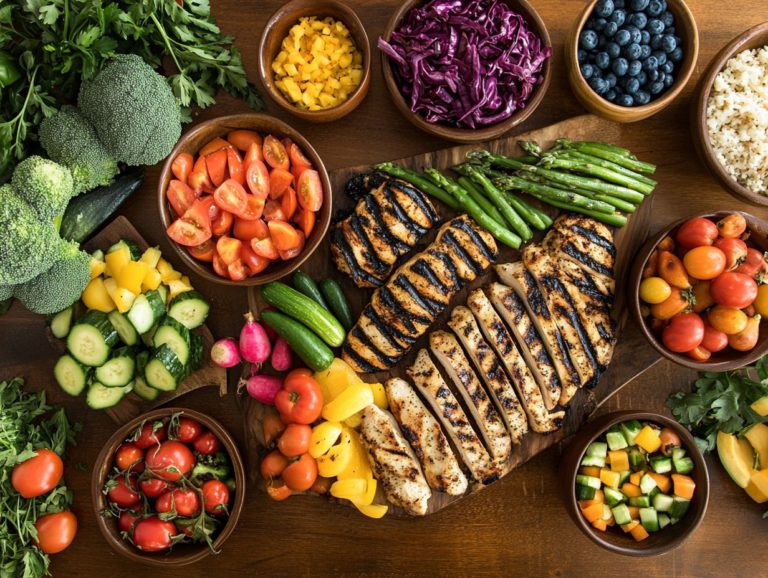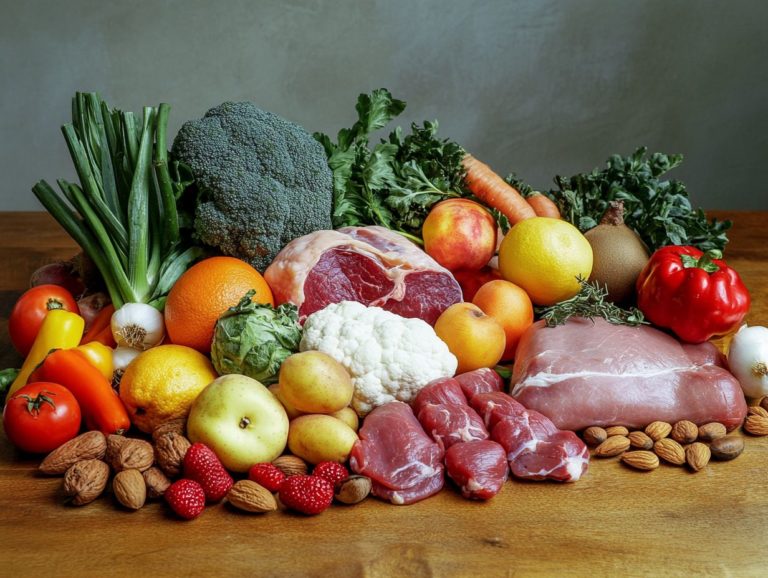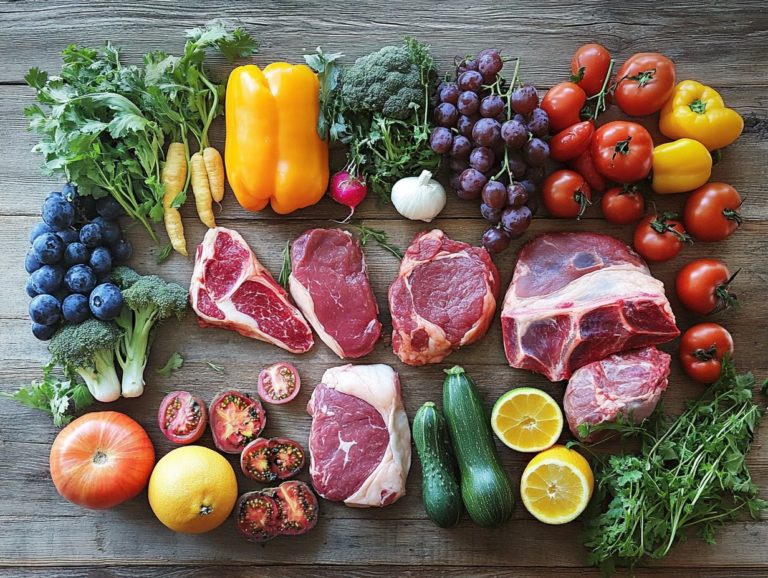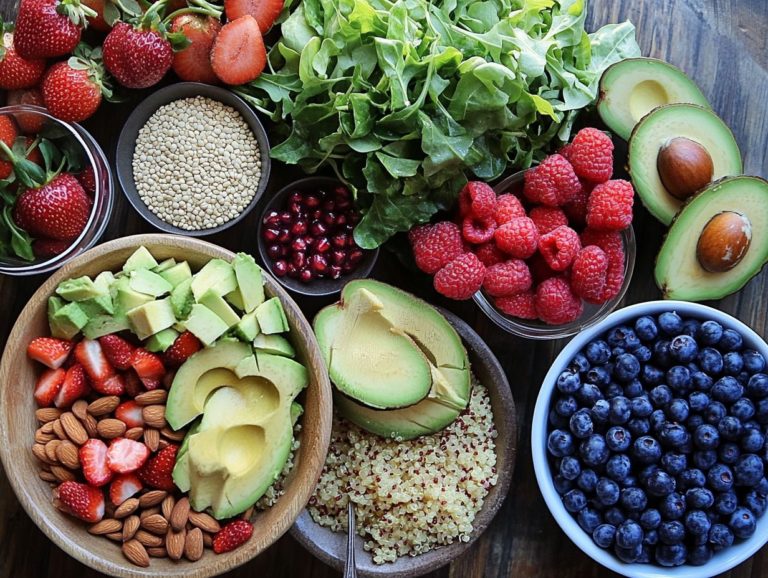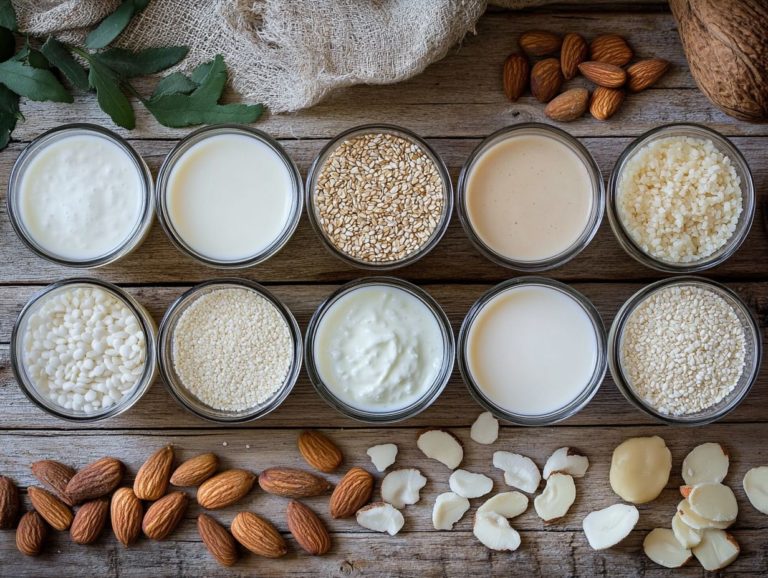The Benefits of a Vegan Diet for Your Health
Curious about the vegan lifestyle? Embracing a vegan diet, abundant in plant-based foods, presents an array of health benefits while also contributing positively to the environment.
From lowering the risk of chronic diseases to boosting your nutritional intake, this dietary choice can truly transform your well-being. However, transitioning to veganism does come with its own set of challenges.
In this exploration, you’ll uncover what a vegan diet entails, the health advantages it offers, its environmental implications, practical tips for making the switch, and strategies for navigating any hurdles you might encounter.
Jump in to find out how a vegan lifestyle can transform your life and help our planet thrive!
Contents
- Key Takeaways:
- What is a Vegan Diet?
- Health Benefits of a Vegan Diet
- Environmental Impact of a Vegan Diet
- How to Transition to a Vegan Diet
- Potential Challenges and Solutions
- Preguntas Frecuentes
- Qu es una dieta vegana y c mo se diferencia de una dieta vegetariana?
- Cu les son los principales beneficios de seguir una dieta vegana para tu salud?
- C mo ayuda una dieta vegana con la p rdida de peso?
- Es posible obtener suficiente prote na en una dieta vegana?
- Cu les son algunos riesgos potenciales de seguir una dieta vegana?
- Puede una dieta vegana beneficiar al medio ambiente as como a tu salud?
Key Takeaways:
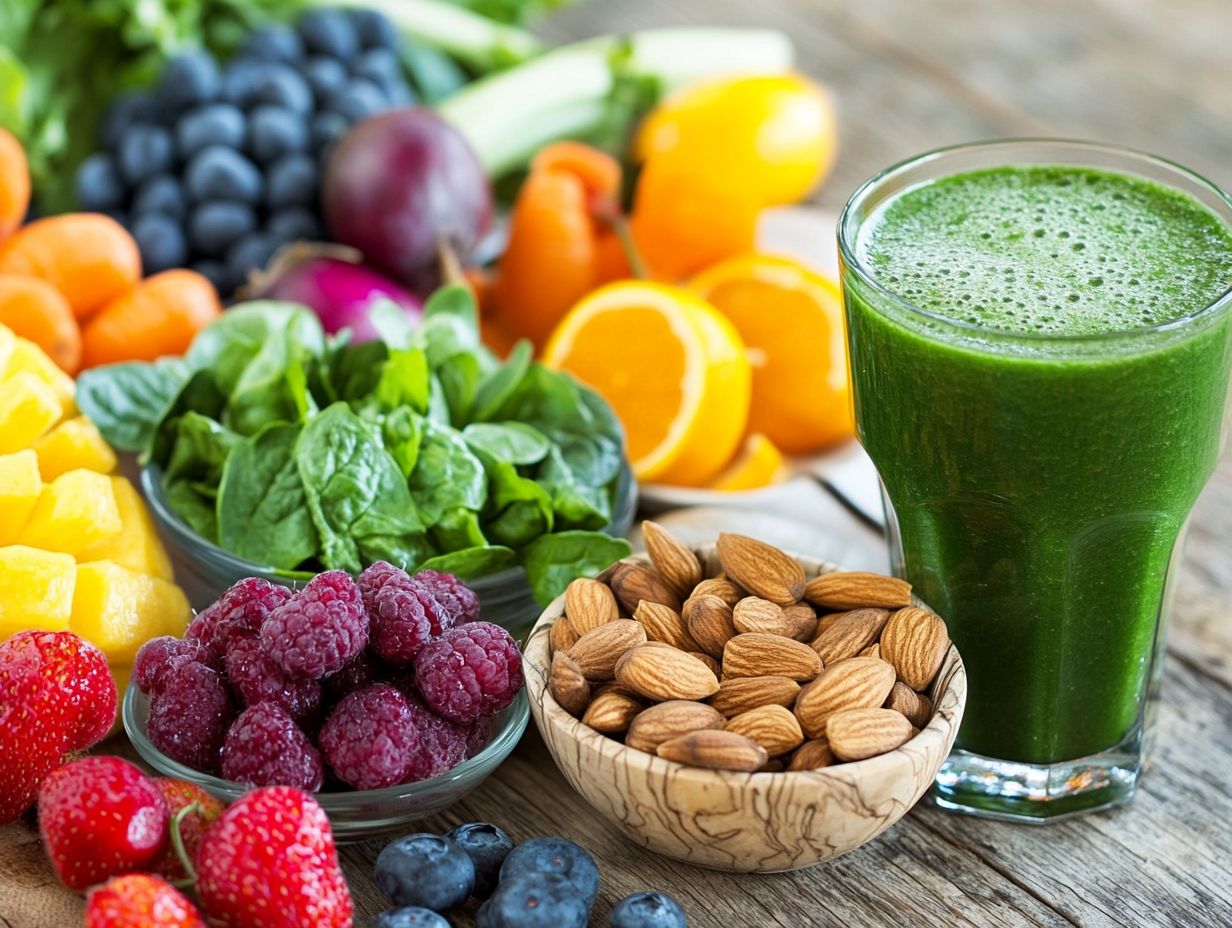
- A vegan diet can lower your risk of chronic diseases like heart disease and type 2 diabetes.
- It encourages eating a variety of fruits, vegetables, and whole grains to boost overall nutrition.
- A vegan diet supports environmental health and ethical sustainability.
What is a Vegan Diet?
A vegan diet is a refined, plant-based approach that excludes all animal products, including meat, dairy, and eggs. Instead, it emphasizes the consumption of whole grains, legumes, fruits, vegetables, nuts, and seeds.
This dietary choice is linked to numerous health benefits, ethical concerns about animal welfare, and a commitment to environmental sustainability.
When thoughtfully planned, a vegan diet can provide you with all the necessary nutrients, particularly when it incorporates fortified foods and a variety of protein sources, ensuring nutritional quality and supporting your overall health.
Health Benefits of a Vegan Diet
The health benefits of a vegan diet are well-established, revealing its remarkable potential for weight management, promoting heart health, and enhancing blood pressure and cholesterol levels.
Research published in prestigious journals like JAMA Internal Medicine and The Lancet highlights that embracing a vegan diet can significantly lower the risk of chronic diseases, including type 2 diabetes and cardiovascular disease, while also reducing complications related to these conditions.
Reduced Risk of Chronic Diseases
Adopting a vegan diet can significantly reduce your risk of chronic diseases, including type 2 diabetes, certain types of cancer, and heart disease. Research shows that individuals who follow a plant-based diet often enjoy lower cholesterol and blood pressure levels key factors in the prevention of these health concerns.
When you consume whole grains, legumes, fruits, and vegetables, you re not just filling your plate; you re also flooding your body with antioxidants and natural compounds found in plants that help protect your body from oxidative stress and inflammation, known culprits behind these diseases.
Studies published in journals like the Journal of the American College of Cardiology reveal that vegans have a 30% lower risk of heart disease compared to those on conventional diets.
By choosing a plant-based eating pattern, you re likely to experience improved insulin sensitivity, a crucial factor in steering clear of type 2 diabetes. These benefits suggest that embracing a vegan lifestyle not only enhances your immediate health but also serves as a powerful strategy for long-term disease prevention.
Improved Nutritional Intake
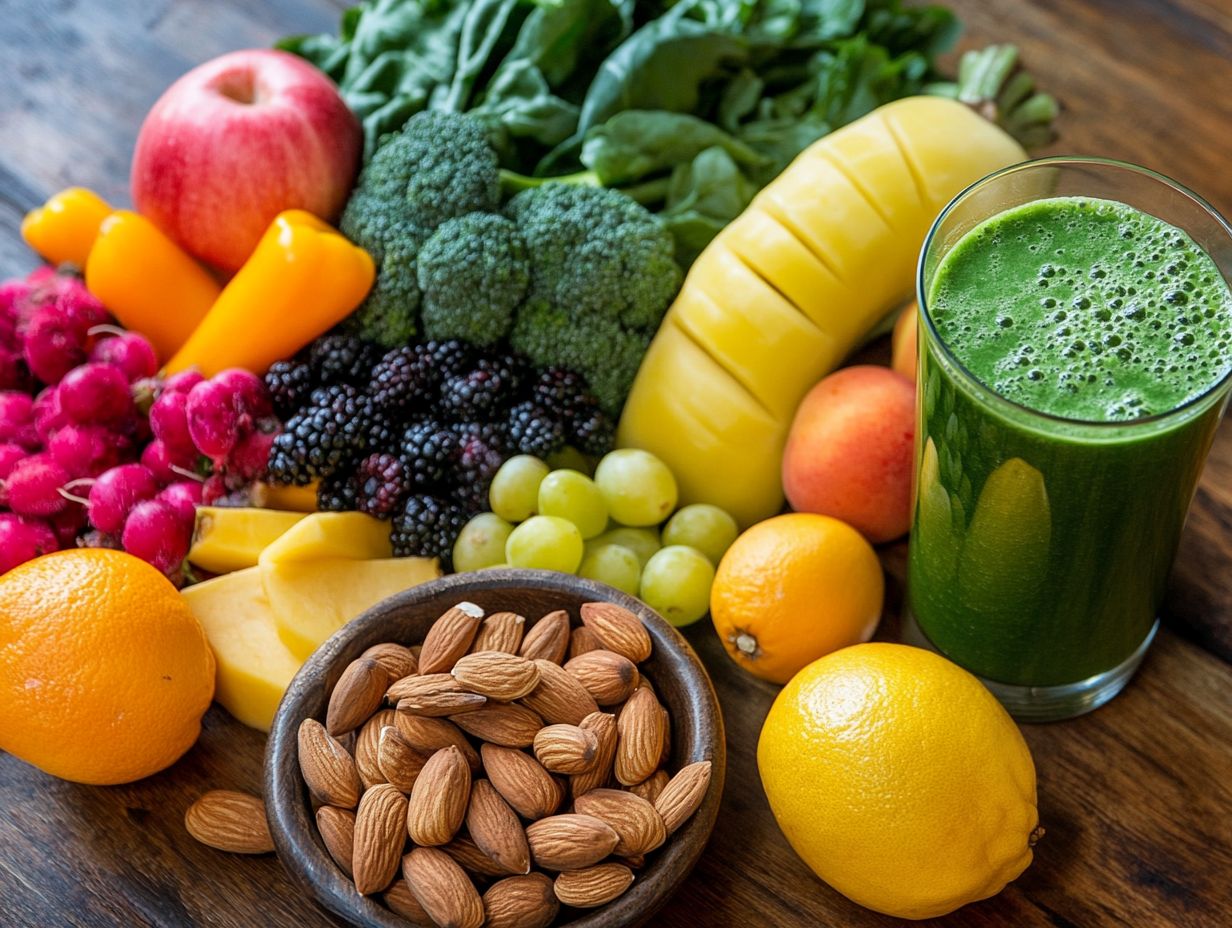
One of the standout advantages of embracing a vegan diet is its ability to elevate your nutritional intake. This is achieved by focusing on diverse plant-based foods that are rich in dietary fiber, vitamins, and minerals.
This shift in your eating habits can significantly enhance gut health. However, it’s crucial to plan meticulously to ensure you re getting enough protein and essential nutrients like Omega-3 fatty acids, which are essential fats that help your heart and brain stay healthy, and vitamin B12.
By incorporating a rich variety of legumes, seeds, nuts, and whole grains, you can effectively reduce the risk of nutrient deficiencies that can arise from a plant-based diet.
To increase your Omega-3 levels, consider adding chia seeds or flaxseeds to your smoothies or cereals. For vitamin B12, fortified plant milks or nutritional yeast can be your go-to options, adding a delightful savory kick to your dishes.
A fantastic recipe that showcases these essential nutrients is a robust lentil salad, blended with quinoa, chopped spinach, and a zesty tahini-lemon dressing. It delivers vital nutrients and adds delicious variety to your meals.
Environmental Impact of a Vegan Diet
The environmental impact of a vegan diet is substantial, promoting sustainability while addressing ethical concerns tied to animal agriculture.
By opting for plant-based foods, you can significantly reduce your carbon footprint, conserve precious water resources, and minimize the land use associated with livestock farming.
This conscious choice contributes to a more sustainable food system, aligning your dietary habits with environmental stewardship.
Sustainability and Ethical Considerations
Adopting a vegan diet often stems from ethical considerations regarding animal welfare and a commitment to sustainability. This addresses pressing issues like factory farming and habitat destruction.
By eliminating animal products from your diet, you can align your eating habits with your values about environmental stewardship and humane treatment of animals.
Choosing this lifestyle can make a real difference in the lives of countless animals subjected to inhumane farming practices. It also plays a role in reducing carbon emissions linked to livestock production.
The ethical implications go even deeper; your demand for plant-based options can encourage a shift toward more humane agricultural practices, inspiring industries to embrace sustainability.
A vegan diet resonates with efforts to restore ecosystems damaged by deforestation and overgrazing. Ultimately, by choosing this lifestyle, you become part of a larger movement that promotes compassion and respect for all living beings and the planet as a whole.
How to Transition to a Vegan Diet
Transitioning to a vegan diet is an exciting journey that invites you to explore a world of diverse recipes and embrace effective strategies for success.
As you embark on this path, it’s essential to gradually introduce plant-based foods, allowing your meals to retain their nutritional quality.
By incorporating ample dietary fiber and essential nutrients, you can make this transition smoother and more enjoyable, setting yourself up for a fulfilling and health-conscious lifestyle.
Tips and Strategies for Success
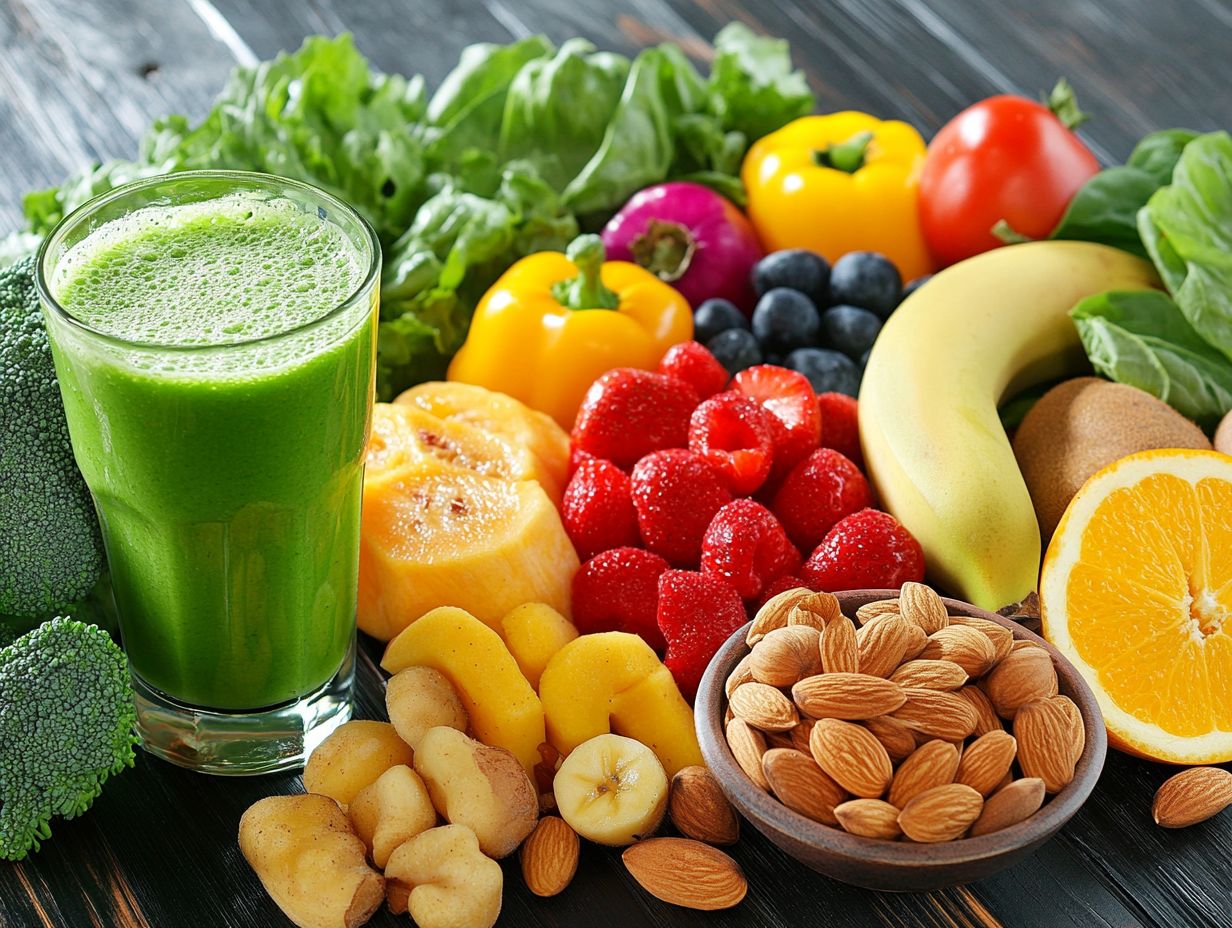
Successfully transitioning to a vegan diet requires thoughtful meal planning and a commitment to incorporating a variety of vegan recipes that provide adequate protein sources and essential nutrients. This approach not only helps you avoid nutrient deficiencies but also elevates your dining experience with diverse flavors and ingredients.
To create a well-rounded meal plan, start by exploring plant-based protein options like lentils, quinoa, beans, and tofu. These ingredients are not only nutritious but also incredibly versatile.
Utilize resources such as vegan cookbooks, online recipe databases, and meal planning apps to streamline the process of discovering innovative dishes that cater to your taste.
Consider seasonal produce to spark creativity in your cooking while ensuring your meals are rich in vitamins and minerals. It s also essential to keep an eye on your nutrient intake, particularly for:
- Vitamin B12
- Iron
- Omega-3 fatty acids
Opt for fortified foods or consider supplements to construct a balanced diet that truly supports your overall health and well-being.
Potential Challenges and Solutions
Transitioning to a vegan diet can present a range of challenges, especially when dealing with social events and addressing nutritional concerns.
With the right preparation and knowledge about dietary fiber, protein sources, and effective communication about your choices, you can manage these hurdles and embrace your vegan journey.
Dealing with Social Events and Nutritional Concerns
Being vegan can be an adventure, especially when dining out or attending events. Thoughtful planning helps you enjoy these gatherings while meeting your dietary needs.
Talk to your hosts in advance to create an inclusive atmosphere. Suggest vegan options or offer to bring a dish to avoid any awkward moments.
Equip yourself with smart strategies, such as inquiring about ingredients or requesting modifications to existing menu items. Engaging in conversations about plant-based eating might even pique the interest of non-vegans, transforming the experience into something enjoyable for everyone.
Balancing your social experiences with your dietary requirements becomes easy when there’s transparency, encouraging meaningful conversations and understanding.
Addressing Nutritional Concerns
Maintaining a healthy vegan diet requires attention to key nutrients. Don t overlook important ones like vitamin B12, calcium, iron, and zinc.
Understanding the role these nutrients play is vital. For instance, vitamin B12 is key for nerve function and blood formation, while calcium and iron are important for bone health and energy levels.
To ensure you re getting enough, consider incorporating foods such as:
- Fortified plant milks
- Legumes
- Nuts
- Seeds
- Leafy greens
Engaging in thoughtful meal planning and being open to supplements when necessary can further ensure your nutritional needs are met. Don’t wait to ensure you’re getting enough!
Preguntas Frecuentes
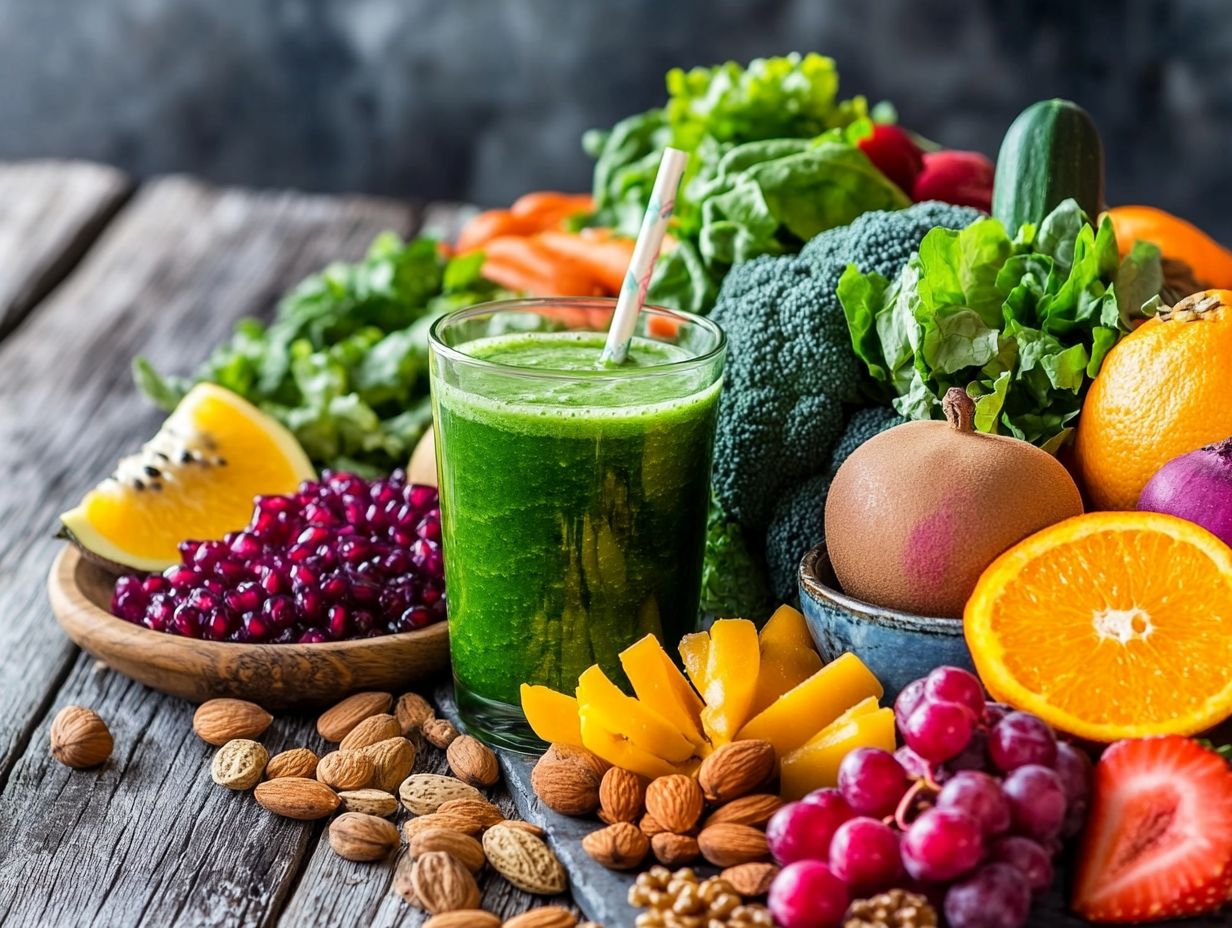
Qu es una dieta vegana y c mo se diferencia de una dieta vegetariana?
Una dieta vegana incluye solo alimentos de origen vegetal y excluye todos los productos animales, mientras que una dieta vegetariana puede incluir l cteos y huevos.
Cu les son los principales beneficios de seguir una dieta vegana para tu salud?
Hay muchos beneficios de una dieta vegana, incluyendo un menor riesgo de enfermedades del coraz n, presi n arterial y niveles de colesterol m s bajos, mejora de la digesti n y un riesgo reducido de desarrollar ciertos tipos de c ncer.
C mo ayuda una dieta vegana con la p rdida de peso?
Una dieta vegana es naturalmente baja en calor as y alta en fibra, lo que la convierte en una excelente opci n para quienes buscan perder peso. Los alimentos de origen vegetal tambi n son t picamente menos densos en calor as que los productos animales, por lo que puedes comer m s y a n as consumir menos calor as.
Es posible obtener suficiente prote na en una dieta vegana?
S , definitivamente es posible obtener suficiente prote na en una dieta vegana. Fuentes de prote nas de origen vegetal como legumbres, tofu, tempeh, nueces y semillas pueden proporcionar todos los amino cidos esenciales que nuestros cuerpos necesitan. Siempre que est s comiendo una variedad de alimentos vegetales integrales, puedes satisfacer f cilmente tus necesidades de prote na.
Cu les son algunos riesgos potenciales de seguir una dieta vegana?
Si bien una dieta vegana puede ser extremadamente beneficiosa para tu salud, hay algunos riesgos potenciales de los que debes estar consciente. Estos incluyen deficiencias potenciales en nutrientes como hierro, calcio y vitamina B12, que se pueden mitigar f cilmente incorporando ciertos alimentos fortificados o suplementos en tu dieta.
Puede una dieta vegana beneficiar al medio ambiente as como a tu salud?
S , una dieta vegana tiene un menor impacto ambiental en comparaci n con una que incluye productos animales. Criar animales para alimento requiere muchos recursos, como tierra y agua, y contribuye a problemas como la deforestaci n y las emisiones de gases da inos.
Elegir una dieta basada en plantas no solo reduce estos problemas, sino que tambi n puede hacer una gran diferencia en tu salud. Imagina un mundo m s limpio y saludable! Adoptar una dieta vegana es un paso poderoso hacia ese futuro.


